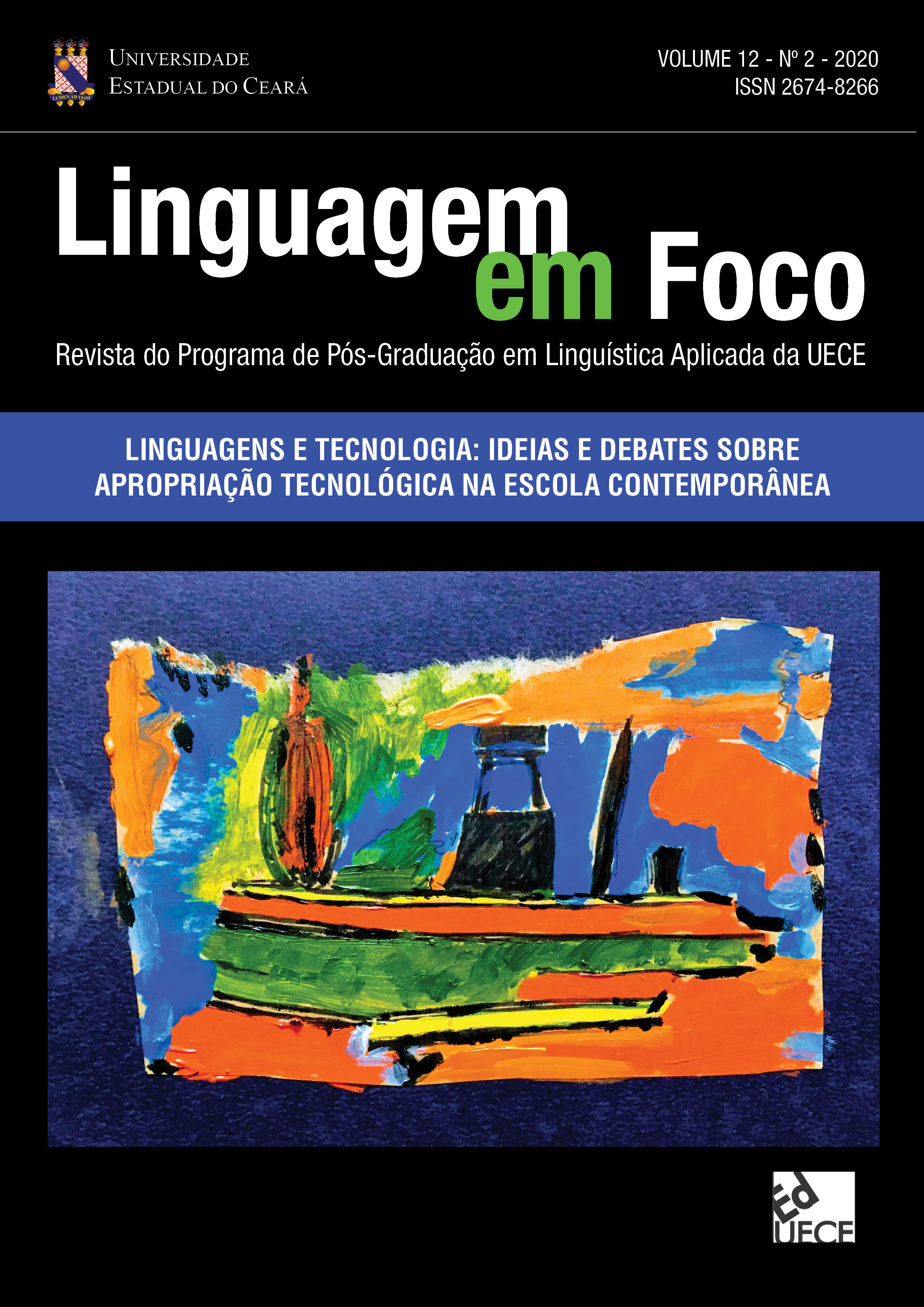Teaching work in times of social isolation
An analysis of the perception of the use of digital technologies by public basic education teachers
DOI:
https://doi.org/10.46230/2674-8266-12-4050Keywords:
Teaching work, Digital technologies, Emergency remote educationAbstract
In this article, we aim to investigate the perception of public basic education teachers about teaching work in the context of emergency remote education, in the face of the Covid-19 pandemic scenario. More specifically, about working conditions, the constitution of practice and teachers' relationships with digital technologies. For data collection, we applied an online questionnaire. As for data analysis, we used Tardif and Lessard (2014) on teaching work; about teacher's relationship with digital technology, Coscarelli and Kersch (2016); about digital literacies, Buzato (2003; 2007) and Araújo and Pinheiro (2014); finally, for the analysis of teachers' statements, we adopted assumptions of the Dialogic Discourse Theory: Bakhtin (2011), Volóchinov (2017), and re-readings, as Brait (2016). As teachers, through language, expressed their appraisals about their work activity, our work matches the scope of studies in Applied Linguistics. We found that, during the realization of remote online classes, several challenges imposed on the teaching activity have been intensified, such as work overload and the difficulty of accessing and using technological resources for educational purposes. In addition, the lack of training of the users involved to face this atypical scenario was also mentioned. Finally, we believe that digital technologies have been much more than an alternative to not remain inert, because their use, even under the conditions faced, can enable teachers to rethink their teaching practice.
Downloads
References
AMORIM, M. Cronotopo e exotopia. In: BRAIT, B. Bakhtin: outros conceitos-chave. Beth Brait (org.). 2.ed.- São Paulo: Contexto, 2012. p. 95-113.
ARAÚJO, J.; PINHEIRO, R.C. Letramento Digital: história, concepção e pesquisa. In: GONÇALVES, A.V.; SILVA, W.R.; GÓIS, M.L.S. (Orgs.) Visibilizar a Linguística Aplicada: abordagens teóricas e metodológicas. Campinas, SP: Pontes Editores, 2014. p.293-320.
BAKHTIN, M.M. (1950). Estética da Criação Verbal. Introdução e tradução do russo Paulo Bezerra. São Paulo: Martins Fontes, 2011.
BRAIT, B. O texto nas reflexões de Bakhtin e do Círculo. In.: BATISTA, Ronaldo de Oliveira, (Org.). O texto e seus conceitos. 1.ed. São Paulo: Parábola Editorial, 2016.
BUZATO, M. E. K. Letramento digital abre portas para o conhecimento. EducaRede. Entrevista por Olivia Rangel Joffily. 23/01/2003. Disponível em: www.educarede.org.br. Acesso em: 05 maio 2020.
BUZATO, M. E. K. Desafios Empírico-Metodológicos para a Pesquisa em Letramentos Digitais. Trabalhos em Linguística Aplicada, Campinas, SP, n.1, jan/jun.; p.45-62, 2007. Disponível em: https://periodicos.sbu.unicamp.br/ojs/index.php/tla/article/view/8639442/0. Acesso em 24 ago. 2020.
COSCARELLI, C.V.; KERSCH, F. Pedagogia dos multiletramentos: alunos conectados? Novas escolas + novos professores. In.: KERSCH, D.F; COSCARELLI, C.V.; CANI, J.B. (Orgs.) Multiletramentos e multimodalidade: ações pedagógicas aplicadas à linguagem. Campinas, SP: Pontes Editores, 2016. p.07-13.
PEREIRA, J. T. Educação e sociedade da informação. In.: COSCARELLI, C. V.; RIBEIRO, A. E. (org). Letramento digital: aspectos sociais e possibilidades pedagógicas. 3. ed. Belo Horizonte: Ceale/Editora autêntica, 2017. p. 13-24.
TARDIF, M.; LESSARD, C. O trabalho docente: elementos para uma teoria da docência como profissão de interações humanas. 9. ed. Petrópolis: Editora Vozes, 2014.
UNESCO. Impacto da COVID-19 na Educação. 2020. Disponível em: https://pt.unesco.org/covid19/educationresponse. Acesso em: 22 jul. 2020.
VOLOCHÍNOV. Marxismo e Filosofia da Linguagem: problemas fundamentais do método sociológico na ciência da linguagem. Tradução de Michel Lahud e Yara Frateschi Vieira, com a colaboração de Lúcia Teixeira Wisnik e Carlos Henrique D. Chagas Cruz. 8. ed. São Paulo: Hucitec, 2017.
Published
How to Cite
Issue
Section
License
Authors who publish in Linguagem em Foco Scientific Journal agree to the following terms:
- Authors retain the copyright and grant the journal the right of first publication. The articles are simultaneously licensed under the Creative Commons Attribution License which allows sharing the work with an acknowledgement of its authorship and initial publication in this journal.
- The concepts issued in signed articles are the absolute and exclusive responsibility of their authors. Therefore, we request a Statement of Copyright, which must be submitted with the manuscript as a Supplementary Document.
- Authors are authorized to make the version of the text published in Linguagem em Foco Scientific Journal available in institutional repositories or other academic work distribution platforms (ex. ResearchGate, Academia.edu).





























